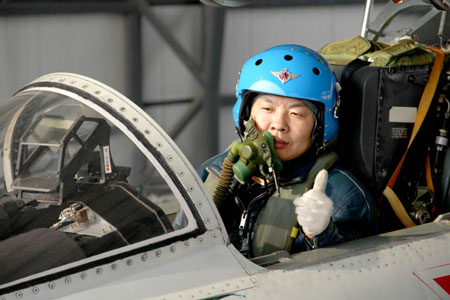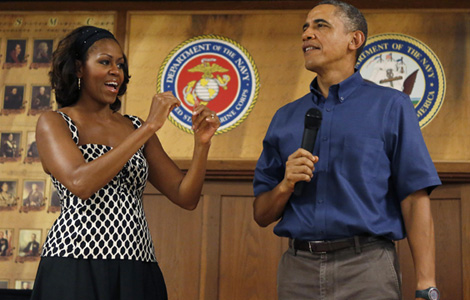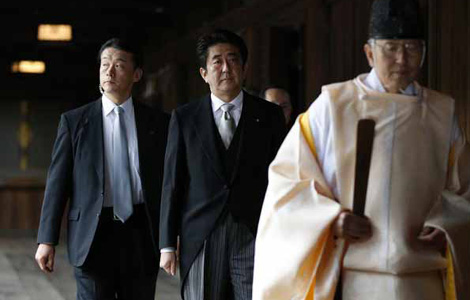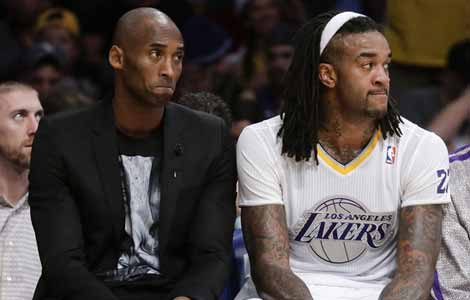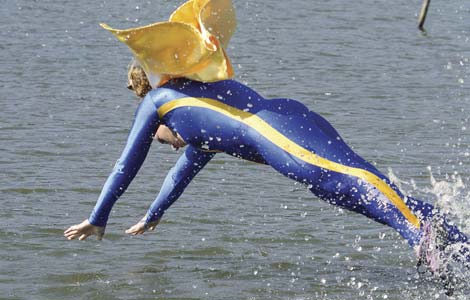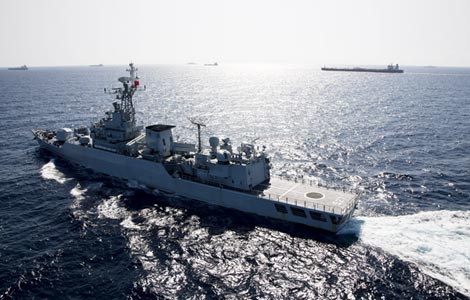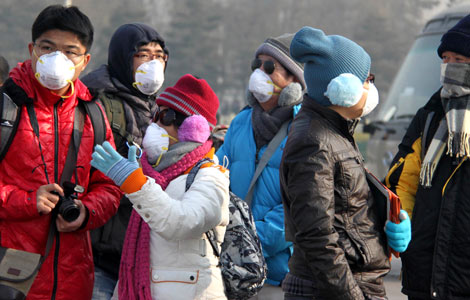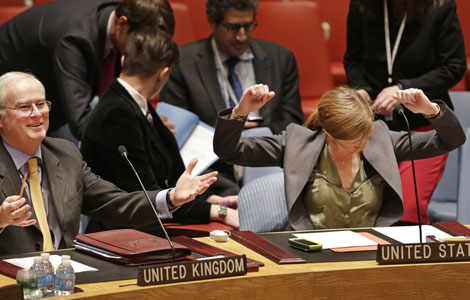Flying high once more
Updated: 2013-12-26 08:16
By Peng Yining (China Daily USA)
|
||||||||
|
Shen Wenjie is back in his cockpit after an operation to remove a brain tumor. Provided to China Daily |
A brain tumor nearly grounded a veteran fighter pilot forever but Shen Wenjie was determined to get back in the air, he tells Peng Yining in Yantai, Shandong province.
While he has never fought in real combat fighter pilot Shen Wenjie faced the fight of his life against a brain tumor.
Around midnight one night in March 2010, the 39-year-old Shen fell into a brief coma without warning. He was sent to hospital for a craniotomy, a surgical operation in which a bone flap is temporarily removed from the skull. Doctors found a tumor, as big as a chicken egg, in his brain.
"Can I fly?"
That was the first question asked by Shen, a captain who has been intensively trained for more than 20 years.
It was very difficult to answer that question at that time. Although the tumor was benign, Shen needed an operation to remove it. Not only his flying career but his health, even his life, were up in the air, according to Zhou Renlu, chief medical officer at Shen's regiment.
"Challenges that fighter pilot face physically and mentally during their missions are far more intensive than ordinary people, and even ordinary pilots, have ever encountered, says Zhou.
Medical officer Xiong Xiaogan flew with Shen from his base in Shandong to Beijing for further treatment.
"I didn't expect a person who experienced such a big operation would be able to fly again. There was no such case in China's military history, says Xiong.
The operation left a scar that was about four centimeters long and shaped like a new moon on Shen's head. "If you look carefully, you can still see the scar," says the soft-spoken Shen, pointing.
"I asked, again, if I could fly, after I woke up from the anesthesia," he says.
This time, the answer was, "Maybe".
That was comforting, he says. "It was better than a 'No'. As long as the doctor didn't say 'No', there was hope.
The risk was obvious, says Pu Zhaodong, the commander of Shen's regiment. If Shen's wound couldn't bear the gravitational acceleration and bursts during a mission, or if he fainted while in the air, not only was he at risk but other people's lives and property would be threatened.
The operation was successful. The tumor was completely removed. The wound healed and his body recovered fast.
Three months after the operation, Shen went back to his training base in Shandong. He joined his fellow pilots in classroom learning and physical training. From jogging for 30 minutes to running a half-marathon, Shen says it too him two months to get back to the level of exercise and fitness he had before the surgery.
"I was feeling good, physically and mentally," he says. "I felt as good as before."
In September 2010, six months after the surgery, Shen applied to fly the fighter. But lingering side effects from medication caused him to fail the physical test.
"I was deeply disappointed," he says, "but I would never give up." After another six months, he finally passed the second checkup and was authorized to fly the fighter again.
Just in case, for Shen's first mission after the surgery, he was partnered to fly with an experienced co-pilot.
"Nevertheless, I was pretty nervous to be honest," says Shen.
Shen is familiar with the risks of being a fighter pilot: In the past two decades, he has witnessed three fatal accidents.
The most recent one was in 2009. A fighter jet crashed into the ocean on a training flight. The pilot, one of Shen's closest friends, died.
"I couldn't go to sleep on the night after he died," says Shen. "We had been studying and living in the same building for many years. We were very close, but all of a sudden he's gone. The plane exploded. We didn't even find his body."
Shen says his friend's accident made him think a lot about risk and death. "Being a fighter pilot means risking your life," he says. "But we all die. The point is to have worthy death."
Shen's first flight after the surgery went well. In the past two years, he has flown nearly 400 hours without incident, close to his average before the surgery.
Besides recovery training flights he completed dozens of mission with a high degree of difficulty including night flights across the ocean in low altitude.
"We flew lower than 100 meter over the water at a speed of 650 kilometer an hour," he says. "It was pitch dark outside, we could only depend on the radar.
Shen says his flight suit was wet from sweat after his first night flight mission after the surgery.
"It was like driving the Formula One with your eyes covered, except we were going faster, much faster," he says.
Shen says the more missions he completed, the more confident he became. "I don't just want to be a pilot who beat a tumor. I want to be a better pilot. Better than before I had the surgery," he says.

At an airport in Shandong province's Yantai city, Shen recently climbed into his gray fighter for a morning drill.
As the engine roared, the ground started to tremble. After the ground crew evacuated to the safe area, the roaring grew louder. While Shen was taxiing out, the blast was overwhelming.
"Once I experienced flying the fighter, I got addicted," Shen says. "There is nothing like this."
Born to a farming family in Hebe province's Wuqiang county, Shen says he helped his father to harvest the wheat and corn in busy seasons before he was recruited by a pilot school at the age of 18.
During the back-breaking work in the field, Shen says he sometimes took a break, and would lie on the ground, with husks and dirt all over his body, looking at the clear blue sky over northern China.
For a country boy who had a healthy body and perfect eyesight joining the military was a good opportunity to leave his backwater hometown.
Shen took a two-month break at home after the operation. The national medal winner's mission then included cooking for his family dropping his 13-year-old daughter off at school and picking her up in the afternoon.
He says most of time he didn't know what to do.
"I could hear the roar of fighter when they flew over my home," he says. "Every time I heard the high sharp sound of our fighters, my heart felt like it was stabbed by a knife. I thought, 'I have to go back'.
Contact the writer pengyining@chinadaily.com.cn
Most Viewed
Editor's Picks

|

|

|

|

|

|
Today's Top News
Reform plans give US 'hope about trade'
Abe's shrine visit grave provocation
Viacom-Sohu.com deal 'a foothold': analyst
Abe to visit Yasukuni Shrine
US just passing the buck
Turk PM reshuffles cabinet
Asian Americans find their history
GDP growth to hit 7.6% this year
US Weekly

|

|
